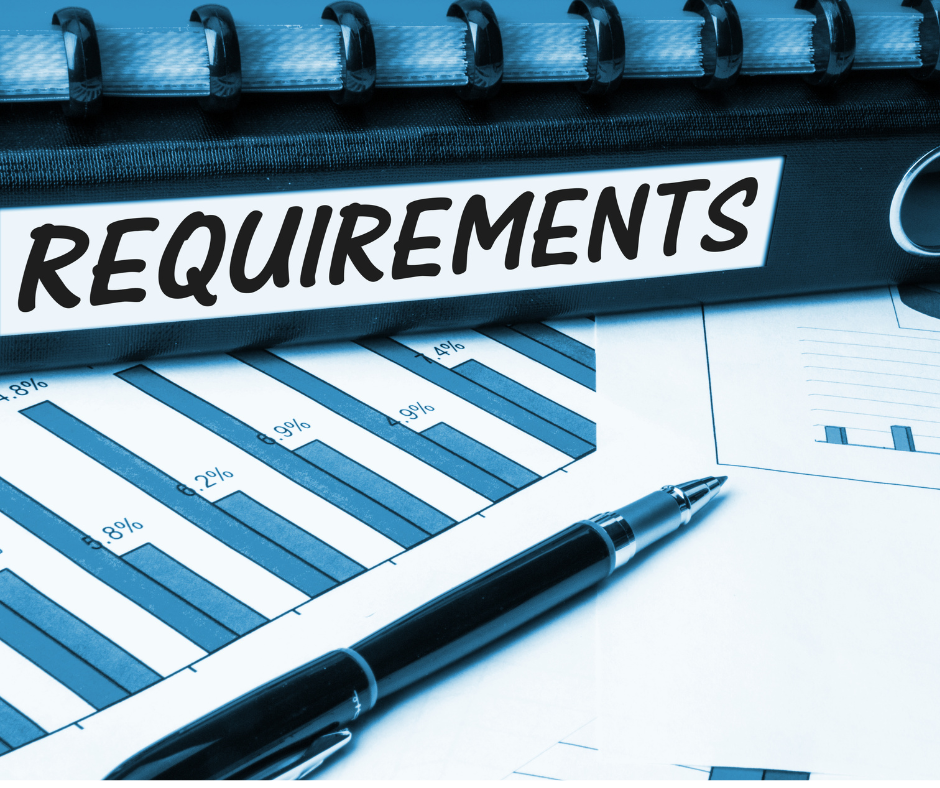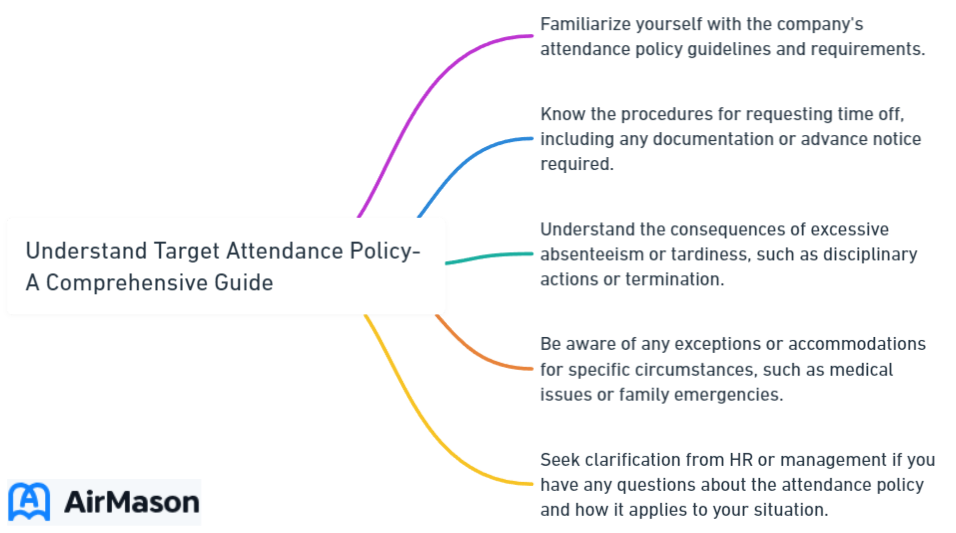
Navigating the attendance policy at your workplace is crucial for maintaining a positive work environment and ensuring job security. Target, a leading retail company, values punctuality and regular attendance as key components of its workforce. So, are you ready to dive into the comprehensive guide on understanding Target’s attendance policy and how it affects employees like you? Armed with this knowledge, you’ll be well-equipped to manage your attendance effectively and maintain a successful career at Target.
In this blog post, we’ll explore the specifics of Target’s attendance policy, discuss the probationary period for new employees, examine the benefits offered to team members, and provide guidance on addressing attendance issues. We’ll also touch upon legal considerations that may impact Target’s attendance policy. Get ready to unlock the secrets to mastering attendance at Target with our focus on the “target attendance policy 2021”!
Key Takeaways
- Target’s attendance policy focuses on punctuality, managing absences and potential consequences.
- Employees should contact their store to responsibly manage sick days and time off, while adhering to legal requirements such as FMLA & ADA.
- Addressing attendance issues involves communication with management and potential HR involvement for corrective actions.
Understanding Target’s Attendance Policy
Target’s attendance policy emphasizes punctuality, managing absences, and any potential consequences for breaching the policy for every team member. Smooth store operations and reduced effects of any individual’s absence on the team can be achieved by adhering to the attendance policy outlined in your employee handbook. Though employees may be absent once or twice per week, excessive absences may result in a warning, and it’s important to treat absences due to mental health similarly to other health-related absences.
Keep in mind that the attendance policy may vary slightly depending on the individual store’s policies. For a comprehensive understanding of the expectations and potential disciplinary action associated with absences, refer to your employee handbook or consult with your supervisor.
Tardiness
While Target does not have an official stance on employee tardiness, employees are expected to work the full duration of their scheduled shifts. In case of an emergency, such as a target fire, employees should follow emergency procedures and inform their supervisors as soon as possible. Target does provide a grace period for employee lateness, allowing employees a five-minute window at the beginning of each work shift without penalties.
Repeated tardiness at Target may lead to consequences such as:
- Verbal warnings
- Written warnings
- Performance evaluations
- Coaching sessions
- Potential impact on raises or promotions
These consequences may vary depending on the policies of each individual store and the severity and frequency of the tardiness.
Therefore, it is crucial to refer to Target’s attendance policy or consult with a supervisor for more detailed information, especially if you are scheduled for two shifts in a day or assigned to a special line.
Absences
Target has established a policy that requires employees to notify the store if they are unable to attend work, with exact details varying depending on the store’s attendance policy. Informing the store as soon as possible is vital, especially if the absence occurs when the store opens. Regardless of the employee handbook builder being used, acceptable reasons for absence at Target include illness, personal emergency, and employer-approved leave of absence.
When you are unable to attend work at Target, follow the appropriate call-out procedures:- Call at least two hours prior to the start of the shift.
- Be courteous and professional when calling out.
- Provide an explanation for the absence.
- Attempt to give as much advance notice as possible.
Target allows employees to call out once a week during business hours. Under specific circumstances, this can be extended to two calls out per week. Providing notice at least a few days in advance is encouraged to enable proper planning and scheduling adjustments.
Consequences
Adherence to Target’s attendance policy is paramount, and failure to comply may result in disciplinary action or termination. If there is a record of excessive absenteeism, disciplinary action may be taken, including potential termination. The process of disciplinary action for attendance policy violation at Target may involve corrective action, such as:
- written counseling, for excessive absenteeism or tardiness
- verbal warning
- final written warning
- suspension
- termination
Exceptions can be made to the consequences of violating Target’s attendance policy, but the specifics may differ among individual Target locations. It is advised to consult the Target employee handbook or speak with a supervisor for more information on the exceptions to the attendance policy.
Business Casual Target
The concept of a “business casual target” is essential in professional settings, dictating the appropriate attire for employees. This target represents a delicate balance between a formal business appearance and a more relaxed, comfortable style. To achieve the perfect balance between professionalism and personal expression in your business attire, it’s important to understand the nuanced expectations of your workplace. This understanding can significantly enhance how you’re perceived in your professional environment. For instance, the assistance of services like seo texte schreiben lassen can be invaluable not just for dressing advice, but also in crafting the tone and style of your professional communications, ensuring they are optimized to meet specific corporate standards..
Navigating Sick Days and Time Off

Sick days, personal time off, and vacation requests are available to Target employees, but it’s essential to manage these responsibly. The contact number to report an illness at Target varies by location and is included in orientation documents. To request sick leave, team members should contact their store and request to speak with the Leader-On-duty (LOD).
Notifying Target of an absence as soon as possible is vital. If you are feeling unwell and are unable to attend work at Target, contact your supervisor immediately and notify them that you will be unable to attend work. Remember, non-employees are not allowed to phone in an absence for a Target employee.Sick Days
Sick days should be employed in the event of genuine illness and notification to management should be provided. As of July 1st, Target provides sick pay to all team members who work an average of 20 hours per week. The number of sick days provided to employees annually may be subject to state, county, or city laws, so it’s essential to consult local laws and Target’s official policies for further information.
To ensure proper notification of a sick day at Target, it is advised to contact either through phone or email, providing the relevant details such as the cause of the absence and the expected duration of the sick leave. No specific requirements or proof are necessary when taking a sick day at Target; however, Target reserves the right to request appropriate documentation in certain circumstances.
Personal Time Off
Personal time off refers to time away from work that can be utilized for a variety of purposes, including vacation, illness, or personal matters. Benefit eligible hourly employees at Target can submit their time off requests through the Workday Time Off icon in the Workday system. It is recommended to request personal time off as early as possible to ensure proper scheduling and coverage at Target, with no specific notice requirement. Target’s policy provides employees with the ability to take immediate personal time off in case of an emergency. There is a designated category of ‘Emergency Time Off’ where employees can accrue hours for such situations. Generally, Target does not deny unpaid personal time off requests, though approval may be contingent on a case-by-case basis.Vacation Requests
At Target, vacation requests must be submitted through the Workday and Kronos mobile app. Once requested, time off must be approved by a supervisor. It is recommended that employees at Target submit vacation requests at least two weeks in advance to ensure proper scheduling and coverage. When evaluating vacation requests, Target management takes into account a variety of factors such as:- Business needs
- Staff coverage
- Time of the year
- Seniority and fairness
- Previous requests
For holiday vacation requests, Target processes them through a two-step process, requiring supervisor authorization prior to taking vacation or personal holiday time.
Target’s Probationary Period

Length of Probationary Period
The standard duration of the probationary period at Target is 90 days. In certain situations, the probationary period at Target may be extended when it is deemed necessary for the employee to have more time to evaluate the suitability of their new hire.
Attendance expectations during the probationary period at Target may vary depending on the job position and location. It is recommended to refer to Target’s official policies or consult with a supervisor for further clarification on attendance expectations during the probationary period.
Attendance Expectations
During the probationary period at Target, employees are expected to meet performance and conduct expectations, including punctuality and regular attendance. Unfortunately, specific details about the attendance expectations during the probationary period are not available in the search results, but it is essential to maintain good attendance during this time to secure your position.
Tardiness during the probation period is defined as arriving more than 5 minutes late for a scheduled shift. During the probation period at Target, there are no allowances for absences or tardiness. It’s essential to demonstrate your commitment to attendance and punctuality during the probationary period to ensure a successful transition into your role at Target.
Target Call Out Policy
The “target call out policy” refers to a set of guidelines and procedures established within an organization or community to effectively identify and address specific objectives or goals. This policy outlines the systematic approach to pinpointing targets, whether they pertain to business objectives, project milestones, or strategic initiatives. It often involves a clear communication strategy that facilitates the dissemination of target information across various levels of the organization. The target call out policy serves as a vital tool to ensure transparency, accountability, and alignment of efforts towards achieving the intended objectives. By establishing a structured and well-defined call out mechanism, organizations can enhance collaboration, streamline workflows, and maintain focus on their targets, ultimately contributing to overall success and progress.
Benefits for Target Team Members

Target provides benefits such as paid time off and holiday pay to eligible team members. The eligibility requirements for PTO at Target may differ based on factors like years of service and role. Therefore, consulting the official Target website or contacting Target’s HR department for comprehensive details on the eligibility requirements for PTO is advisable.
In addition to paid time off and holiday pay, Target offers the following benefits for its team members:- Discounts
- Rewards
- Flexible work hours
- Well-being support
- Resources for financial support
Paid Time Off (PTO)
Paid time off (PTO) is accrued based on an individual’s employment duration and position and can be utilized for vacation, sick, or personal days. After one year of employment, hourly full-time and part-time employees at Target are entitled to vacation time. Entitlement status is determined by the amount of hours worked in a given week. The accrual rate for PTO at Target might vary based on the position and length of employment. Therefore, consulting Target’s official policies or directly reaching out to Target for more information is necessary.
Target’s Paid Time Off policy generally provides 0-10 days off annually, with 74% of employees not expected to work while away from the office. Additionally, Target offers time off for six national holidays and may provide vacation time and personal holidays to employees.
Target employees are eligible to accrue up to 40 hours of paid time off (PTO) per week.Holiday Pay
Target provides holiday pay to eligible employees, which includes 8 hours of holiday pay for employees scheduled to work on a holiday. The amount paid is dependent upon the employee’s average hours, with a minimum of 8 paid hours per holiday. Target recognizes six national holidays for holiday pay, including:
- New Year’s Day
- Memorial Day
- Independence Day
- Labor Day
- Thanksgiving Day
- Christmas
Addressing Attendance Issues

Addressing attendance issues at Target involves communication with management and possible HR involvement. In any of the top 5 employee handbook software, the procedure would be similar for addressing attendance issues with management at Target involves reviewing the attendance policy, scheduling a meeting, communicating the problem, discussing potential solutions, and following up. To effectively address attendance issues with Target’s management, employees should review the attendance policy, communicate early, document reasons, request a meeting, seek support, and follow through on commitments.
HR at Target manages attendance issues by:
- Instituting an attendance policy that necessitates employees to contact the company if they are unable to attend work
- Becoming involved in attendance issues at Target when there are concerns or violations related to the policy
- Enforcing the attendance policy
- Tracking attendance records
- Taking the necessary corrective actions when required
Communicating with Management
At Target, employees have multiple options for communicating with their managers, including internal communication tools such as Redtalk and Target Wiki, direct messaging platforms like email or instant messaging, and traditional phone calls.
In communicating about attendance issues to a Target’s manager, the following information should be included:- Clear articulation of the attendance policies and absence procedures
- Detailed information regarding the employee’s attendance issues
- Explanation of the effect of the attendance issues on the team or department
- A request for a meeting to address the attendance concerns.
Maintain a professional and respectful demeanor, emphasizing the search for a solution to improve attendance rather than assigning blame. Team Leads and Managers should be consulted regarding attendance issues.
HR Involvement
The role of HR in attendance issues at Target includes:- Monitoring and addressing any unsatisfactory attendance in a timely and consistent manner
- Enforcing the attendance policy
- Tracking attendance records
- Taking necessary corrective actions when required
- Collaborating with supervisors to address and resolve attendance issues effectively.
- Articulate attendance policies and absence procedures to HR.
- Provide any necessary documentation of absences and related information.
- Request a meeting with HR to discuss the attendance issues and ascertain the reasons behind them.
- Work cooperatively with HR in addressing the attendance problems and finding solutions.
- Comply with any corrective action or performance improvement plans provided by HR.
Maintaining open communication with HR throughout the process is vital for a satisfactory resolution to the attendance issues.
Business Comfortable
When it comes to creating a productive work environment, it’s crucial to strike a balance between professionalism and comfort, embodying what we refer to as “business comfortable.” This concept encapsulates the idea that employees should feel at ease and relaxed in their work settings, allowing them to focus on their tasks and collaborate effectively. Achieving a business comfortable atmosphere involves providing ergonomic furniture, ample natural lighting, well-designed office spaces, and appropriate temperature control. It’s about fostering an environment where employees can dress in a manner that’s both professional and comfortable, promoting self-expression and confidence. Ultimately, embracing the notion of being business comfortable contributes to a positive workplace culture and boosts overall productivity and employee satisfaction.
Legal Considerations

Legal considerations, such as the Family and Medical Leave Act (FMLA) and the Americans with Disabilities Act (ADA), may impact Target’s attendance policy. The FMLA provides eligible employees with up to 12 weeks of unpaid leave per year for certain family and medical reasons. Target is obligated to honor FMLA and permit employees to take up to 12 weeks off under FMLA; however, the leave is unpaid, and Target’s attendance policy may still be applicable in terms of tracking and managing attendance during the leave period.
The ADA necessitates that Target provide reasonable accommodations to qualified individuals with disabilities, which may influence their attendance policy. Target must ensure that its attendance policy does not discriminate against employees with disabilities and must make reasonable accommodations to enable them to fulfill their job responsibilities.
Family and Medical Leave Act (FMLA)
The Family and Medical Leave Act (FMLA) is a federal program that provides eligible employees with up to 12 weeks of unpaid leave per year for certain family and medical reasons. An employee must have worked for a covered employer for at least 12 months and have accrued at least 1,250 hours of service with the employer to be eligible for leave under the FMLA.
Under the FMLA, qualifying family and medical reasons for leave include:- Birth and bonding with a newborn child
- Adoption or foster placement and bonding with a newly placed child
- Care for a family member with a serious health condition
- Personal serious health condition that renders an employee unable to perform their job duties.
Under the FMLA, eligible employees are entitled to up to 12 workweeks of leave in a 12-month period for any FMLA leave reason except military caregiver leave. Moreover, eligible employees are able to take up to 26 workweeks of leave in a single 12-month period to care for a covered servicemember with a serious injury or illness.
Americans with Disabilities Act (ADA)
The Americans with Disabilities Act (ADA) is a civil rights law that prohibits discrimination against individuals with disabilities in various areas of public life, including employment, transportation, and access to public services. It guarantees that individuals with disabilities have the same rights and privileges as all other members of society.
Adjustments to attendance policies may need to be made as the ADA requires employers to provide reasonable accommodations for employees with disabilities. Reasonable accommodations for attendance under the ADA may include:- Job restructuring
- Modified work schedules
- Flexible leave policies
- Acquiring or modifying equipment
- Providing adaptive equipment for employees with disabilities.
Summary
In this comprehensive guide, we have explored Target’s attendance policy, probationary period, available benefits, and methods to address attendance issues. We also delved into the legal considerations that may impact Target’s attendance policy, such as the Family and Medical Leave Act and the Americans with Disabilities Act. By understanding and adhering to Target’s attendance policy, you can ensure a successful and enjoyable career with the company. If you’re interested in other employee handbook examples you can view more from Airmason.
With the knowledge acquired in this blog post, you are well-equipped to navigate Target’s attendance policy and maintain a strong professional relationship with your employer. Remember, communication is key, and being proactive in addressing any attendance concerns will help you thrive at Target. Keep aiming high, and let your punctuality and commitment to attendance shine through!
